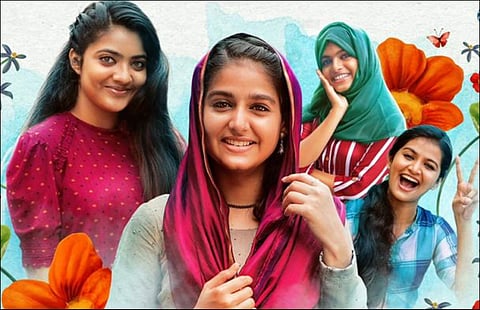Vaanku Movie Review: A fuzzy, occasionally awkward film
Rating:(2 / 5)
After Theevandi and And the Oscar Goes To, Vaanku is the third film where one supporting character's gesture during the protagonist's birth creates a significant impact in the latter's growing years. In Theevandi, it was cigarette smoke; in Oscar, cinema. In debutant Kavya Prakash's Vaanku, a father (Vineeth) recites Quran verses into his baby daughter's right ear just moments after she comes out of her mother's womb. We later see a flashback, which reveals how a muezzin's adhan (call to prayer) calmed her during a crying episode while she was a little girl. The girl, Raziya (Anaswara Rajan) is now in the final year of college. While in the middle of a class, their female lecturer suggests a potentially troublesome idea: to fulfil their wishes before leaving college. Little does she know that one of them will be a source of much panic.
Director: Kavya Prakash
Cast: Anaswara Rajan, Vineeth, Sarasa Balussery
These early portions, where Raziya's friends go about fulfilling their wishes, are some of the most awkward moments I've seen in cinema. Suffice to say that one girl assumed a gay boy would fall for her despite "giving his heart and body" to another boy. She reasons that he is the only person who enjoys the sub-par food in the college canteen, leading her to assume that he would "adjust" in her case too. On hearing this, her girlfriends burst out laughing. I didn't. Less awkward is the scene where one girl hugs a senior male lecturer because he reminds her of her father. But you know what's super awkward? When the female lecturer blurts out, "Will I hear next that some girl raped the principal?"
Thankfully, we are spared such off-putting jokes (if you can call them that) in the film's later portions. Vaanku is a fairly bold film with good intentions, but unfortunately, it lacks the necessary clarity - just like some of its characters. When Raziya brings up her wish to recite adhan, it ruffles feathers, some of which belong to her staunchly conservative father (a sufficiently intimidating Vineeth). She and her family suddenly have crosshairs on their backs.
Rather than making strong arguments against religious norms, I think the film wanted to present the idea of gender representation - the soothing thought of the possibility of a woman's voice adding more beauty to it. When a girl expresses her wish to recite something that has been considered a male domain for centuries, we expect conflicts. The Muslim male students in her college have already started threatening her with bodily harm. Some of the elders - both men and women - see it as the work of the devil. But all hope is not lost because there are a few women in her family who, despite their seniority and religious beliefs, think differently. In one scene, the matriarch (the ever-reliable Sarasa Balussery) reprimands Raziya's father for imposing his regressive mentality on his wife and daughter. We see the effect of the divisions in the colours of their costumes.
To a certain extent, I liked what Vineeth and Anaswara do in the film. Raziya is a welcome departure from the roles Anaswara has done earlier. In Thanneer Mathan Dinangal, she played a high-school student to perfection. In Vaanku, she effectively conveys the maturity of a college student. We also get a slight idea about Raziya from the details in her room. There is a Malayalam translation of an Osho book here and a David Baldacci novel there. And her equation with Vineeth gets quite tense at times - like that scene where the latter is driving her home without saying a single word. You worry about what will come later.
But despite such moments, which are few and far between, and despite Vineeth and Anaswara managing to do justice to their roles, I felt their characters needed more fleshing out. There is a general air of indecisiveness. For instance, we don't see the outcome of a marriage proposal situation. Or perhaps, I forgot some details. You see, this is that kind of film - it doesn't have many memorable moments. The television soap opera vibe doesn't help either. One forlorn scene with Anaswara has the nature of a street play and looks unintentionally comical. There are moments that feel needlessly stretched, not to mention the jarringly mismatched music, which is a combination of two contrasting tunes played alternatively. It is particularly noticeable in the climax which, I'm guessing, was supposed to give us a sense of some great adventure but failed to deliver.
By the end of the film, I wondered why Raziya couldn't have done what she ends up doing in the climax much earlier - without telling her parents, that is. Was all the hullabaloo preceding it necessary? Perhaps the whole thing would have worked better as a short film instead.

